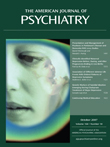Abstract
Objective: Cognitive models suggest that biased processing of emotional information may play a role in the genesis and maintenance of psychotic symptoms. The role of dopamine and dopamine antagonists in the processing of such information remains unclear. The authors investigated the effect of a dopamine antagonist on perception of, and memory for, emotional information in healthy volunteers. Method: Thirty-three healthy male volunteers were randomly assigned to a single-blind intervention of either a single dose of the dopamine D 2 /D 3 antagonist amisulpride or placebo. An attentional blink task and an emotional memory task were then administered to assess the affective modulation of attention and memory, respectively. Results: A significant interaction was observed between stimulus valence and drug on recognition memory accuracy; further contrasts revealed enhanced memory for aversive-arousing compared with neutral stimuli in the placebo but not the amisulpride group. No effect of amisulpride was observed on the perception of emotional stimuli. Conclusions: Amisulpride abolished the enhanced memory for emotionally arousing stimuli seen in the placebo group but had no effect on the perception of such stimuli. These results suggests that dopamine plays a significant role in biasing memory toward emotionally salient information and that dopamine antagonists may act by attenuating this bias.



